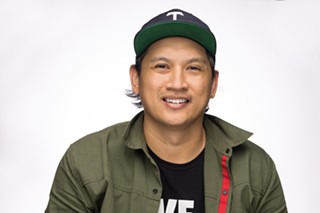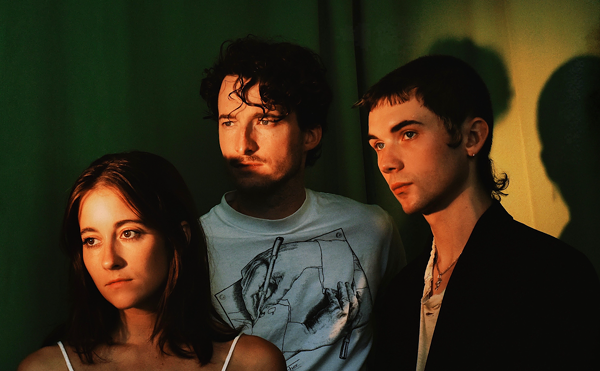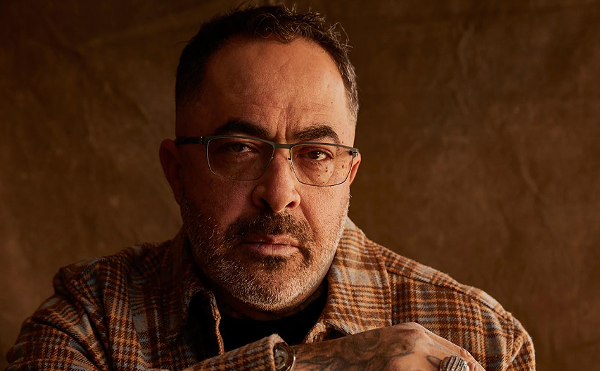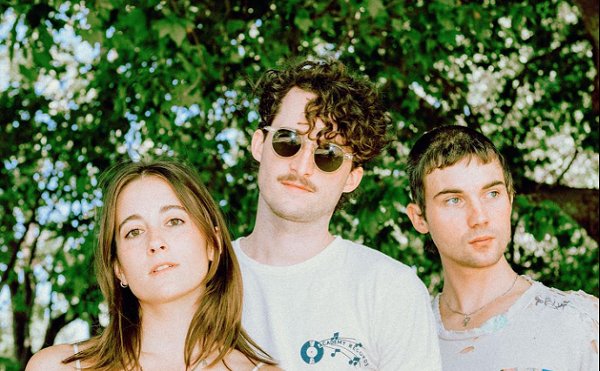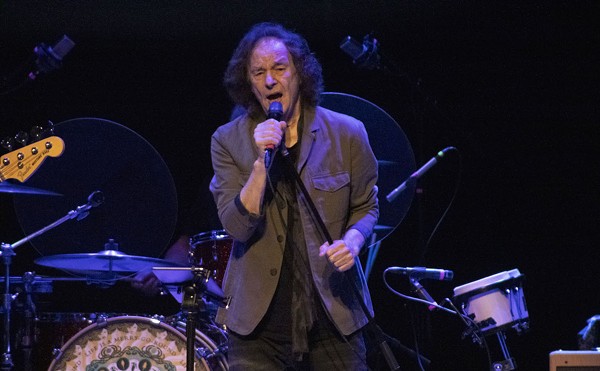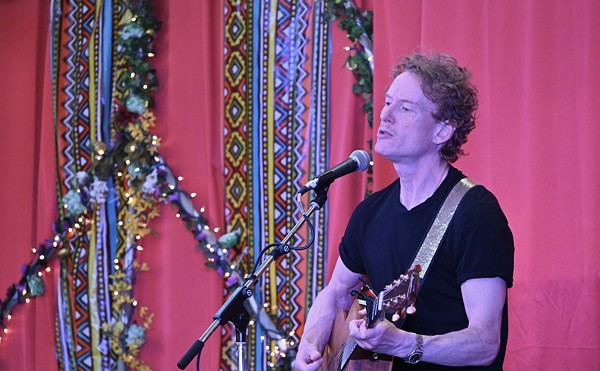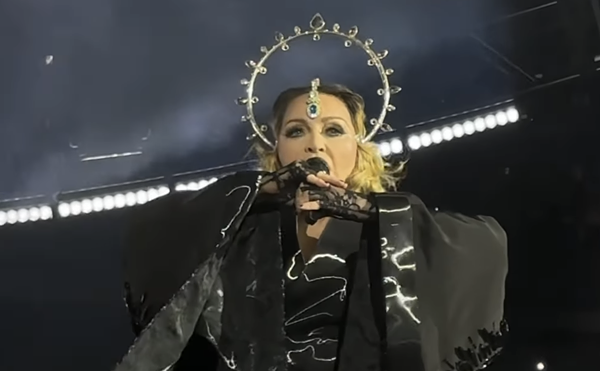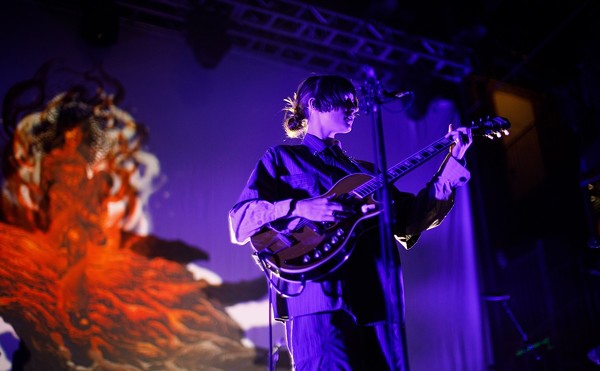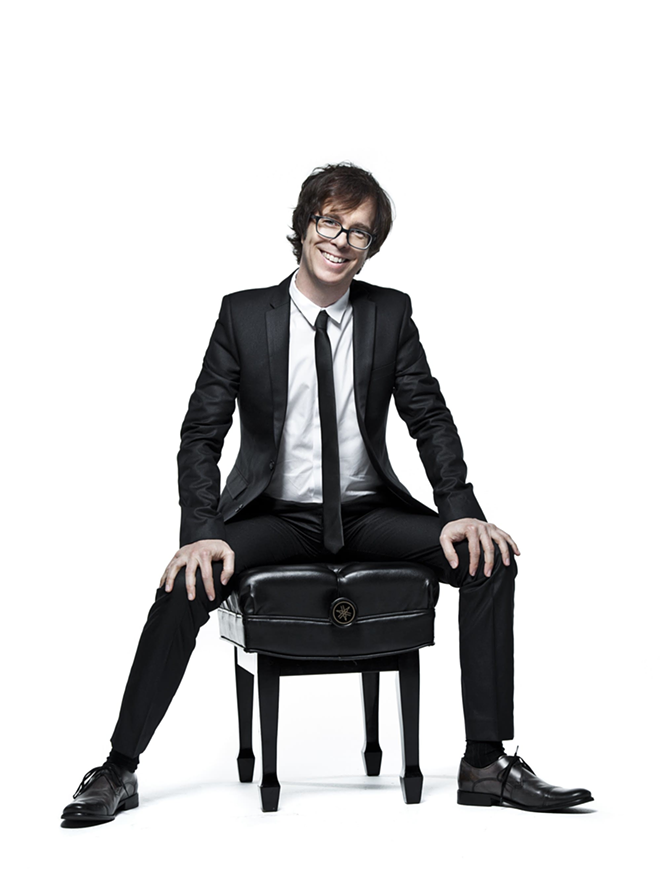
Ben Folds has good timing, even with jokes.
"My work is done. My work is done," Folds, 51, told CL when asked about what he's got left to learn musically.
"Fuck it, I'm out of here."
It's funny because the pianist and songwriter who 20 years ago — with his trio, the Ben Folds Five — gave the world "Brick," is still learning heaps thanks to a gig with Washington D.C.'s National Symphony Orchestra, where he was named artistic adviser in May.
"Every show that I put on there, I have to become familiar with the music, I consult conductors and musicians that I know, read, try and get into the middle of what is I am performing, just that in itself is a load of learning. If I was going to music conservatory right now I wouldn't be learning any more," he added.
"I am cramming stuff into my head, so I'm diggin' it. I'm getting quite the education."
For a fast 15-minutes, Folds — who brings his half-planned, half-request-by-paper-airplane show to Tampa's Straz Center on November 11 — gave us a quick education on his unorthodox scheduling planning, the process behind hatching his song ideas, his love for University of Miami school of music dean Shelly Berg and more.
Read our Q&A and get more information on the show below. Read our review of his 2014 set at the Straz here.
Hey Ben, how are you?
Good, how are you?
Not bad, man. I know you just got off kind of a kind of boring, or business call, so we'll try not to make it was lame for you.
Haha, that's right.
In September you talked about “narrowing the next chapter of my artistic career down to five major projects”...
Oh, yeah.
Plus your post at the National Symphony Orchestra gig which is a lot — care to elaborate on those projects and how you’re going to have time for that much activity? I mean what’s the 2018 calendar look like as far as Xs, Ws, Rs, etc. go?
Oh, yea, that's interesting. Did I mention that I put Xs and Ws all over my calendar?
Yeah, you said it.
Maybe, I wonder if that's not what everyone did. Yeah, that didn't work out, haha. I got to the end of the year, and I started to look at all of these Xs, and they had nothing to do with what I'd actually done, so I just went through and started erasing them, and I think I'm still on the calendar, that I had done that. It was total bullshit, and maybe just a way to get my mind together.Lemme think, next year. I think, you know, there's this whole gradation.
You're gonna find out why I never follow the Xs and Ws because I am gonna walk you around in circles and then you're gonna be like, "Shit, I shouldn't have asked him that — he's not giving me any answer at all." I just wanna do so many things, and there's just no time, I can't — I think that's gonna be the gist of this. I've got some, um, actually, I need to write songs. I have a whole shitload of song eggs that need to be hatched.
OK.
Over time that happens, you know. I think I know what they are, but it's not quite that simple — there's just so many fragments of stuff. Why I would finish those, they need a home. Say I'm writing a musical theater piece, that would be the home for some of them, I'm sure because there's so much good stuff that it really does kind of work that way. Um, where they go, I think when you're writing it's always collaborating with your circumstances, um, and, um, so there's, you know. Where they go, what I decide to do with my life is a little bit of the art form of it.
READ MORE
Concert review: The Ben Folds Orchestral Experience at the Straz Center
So I say, "Yes," to one of these many musical theater things I've said no to for most of my career, which I'm considering. It just needs to be the right thing, and there are a few almost right things, and so I'm just gonna see what happens. So there's that, there's making a straight up record, like, "These need to be hatched — let's go make a straight up record," and I can see doing that. I've been interested in writing one, you know, 20-minute piece with choir, uh, probably for the National Symphony Orchestra that would happen late 2018, early 2019, something like that.
Hopefully.
There's a couple of television, sort of, relatively humble because I don't actually want more of that when it comes to television, but just things to teach, uh, basically to teach people about music. Two different ideas of that, and then there's the one I am doing at the Kennedy Center normally anyway, um, I can't remember, there was something else. I am trying to narrow them down.
At least the way of touring right now has been narrowed down because I am pretty solidly in solo piano or orchestra mode — I really like that. I like walking in, and there is the symphony orchestra, you meet them, play or you walk up on stage, and play. I think those two things have been really nice for me. They've given me a lot of musical freedom.
I don't know what else I've left out. There have to be some plans we're thinking about, but, I think the most pressing thing is taking these songs and making them songs.
I know you are bringing the Paper Airplane tour to Tampa, but you talked about being able to walk into a room, meeting the orchestra and playing, but you really get into the nitty gritty with the municipal orchestras you play with. Some of the other touring productions that team with local orchestras say they only have about three or four hours to polish things up in person. Obviously you've got someone charting things for you ahead of time, but Is your situation any different — do you ever have enough time? It seems like you're so invested in even the individuals within the ensembles.
Well, I mean most orchestras are very, very, very good.
I mean, they're, it's, you have to bring in charts, of course, that are challenging, yet playable, and you do have to have a conductor that is gonna get that out of them, and then, you know, it's my responsibility to make sure that they do it, you know. I've, the first initial batch of 40, and that's a lot of charts, I spent serious time revising those. I didn't do all the charting myself, but to sit on the stage and know, "OK, I need to gap there, I need this, this is not playable." You start to figure that stuff out. You have to sit down, "X, note head change, change phrasing," and send it back to the guy, and have him, um, get it right.
If you're doing those thing actively, as soon as I decided, yes I would do these orchestra shows, because I didn't agree to it for a few years. I didn't really think it was a good idea. I've had other friends, I remember John from Cake calling me up. I don't know if they ever did it, but he said he was getting a lot of orchestras approached, and should he do it, and I told him what was involved, if he wanted to do it.
Well, he didn't sound like wanted to do it anymore, which I thought was pretty smart because it's not something your part-time, and I knew that when I jumped into it because I've been playing in orchestras since I was a kid. I started doing that as, you know, kind of playing percussion, seriously, I was really into it when I was, I don't know maybe eight or nine years old. Maybe nine years old is when I started playing with the youth symphony, and I did that all the way until I was 17. Um, so, I kind of knew that.
But we come in as prepared as you can be, and knowing — especially when you play with a local orchestra for a first time, their assumption is that you're not, and their assumption is that this is an utter waste of their time to get people in seats — and, um, so you know, you're working from that. But that's been good. They challenge you to get it right without knowing it. So we come in, and we're doing it pretty much, you know. And I've played more of those things than most pop artists have. I can't remember how many, it's whatever, 100 shows in the last five years, I think, with most of the orchestras in the U.S. That's a lot of orchestra playing, a lot of orchestras.
Yeah you play a lot, and you still kind of beat the shit out of your piano every night. I saw you broke a piano string in Oklahoma, um so it's always kind of cool to see you play really hard...
I think that's really funny. I break a lot of strings, yeah.
Who pays for that?
Well, they are pianos, we carry a piano with us, and we carry an extra set of strings, which cost about $500 for the whole set, so, I mean, really, it's not — by the time I break a string on the piano, if I've been playing guitar and changing strings for a few months, it's more expensive to change guitar strings.
Right on.
So it's not that expensive.
And uh, how do you choose which paper airplanes to open? I think some people are really decorating them up. Are you ever scared that you're gonna open one up, and it's just a lewd drawing or something?
Oh, that happens all the time. I get those, you know, messages of, you know, "Play all of Ginuwine's album," something like that. I mean, just, you know, a bunch of crap. I just drop them back on the floor.
At first I tried to honor each and every one for the first couple of shows, and that was actually not helping the show because I could have played — well most of the audience could have been happier if I had just played a lot of other things that I have written, but that took up a lot of time, so, you know, you live and you learn. But they were still funny shows. It created an atmosphere that everyone was really happy with, but I think there's a line between, you know, the artistry of it is that I've written a whole lot of music, and, um, that, this would have me play ones that I maybe wouldn't have always been playing, or, um, why move the set next to another song.
I know Louis C.K. said that he liked to change up his material in order almost every night because, you know, a joke is a different animal if it's in a different context. And if I'm writing a set, I would never make sets in these orders, and I think that's very interesting to look at your songs in that sort of, uh, uh, extremely modular kind of way — it's kind of cool.
On the showbiz side, It can't go too far that way. It's hard not to make it like a big circus, but that's not why I'm there. I'm there because I write songs. And I think between it being kind of a fun thing and being interesting musically is what you shoot for, and the fun thing is just simple matter or good manners. Like, "Well, these people are over at your house again, they come over again, you might as well have the board games for 'em."
Haha, that's awesome. I know that I don't have that much time, but I like that thing you mentioned about not, kind of, knowing what the set is gonna be like once you open up the airplanes, and how there's artistry in that and you were able to kind of draw some inspiration and live in a different zone. What's the last thing — your creation or not — that really moved you or gave you chills? I know you really like all your records, but I know you're always looking for something that is really gonna move you.
Um, you know, everything, I've made records for a long time, but I'm not as prolific as people would think. I've just been very consistent, and I don't write, I really have to say, I don't write stuff that didn't start at least by giving me some kind of big feeling or came from something. Maybe something like the last record. Something like "F10-D-A," which is a joke. Yeah, okay, got that, that probably didn't make me feel that much, but almost anything, almost anything I write — see the problem is that they start there. Your job is to detach yourself from it as a songwriter, at some point.
Now, people finish songs really quickly sometimes, that's just what they do because they can stay in touch with the feeling, and I like that when I can, but more than not I find that I need to actually spend time on the craft of it, which means it's time to put the gloves on, and lab coat, and you don't feel it anymore — you just don't. But you know that you did, I know that I did when I started, so I guess my point it that they all start that way, but I have no way of knowing where they really ended up until, maybe, in a way, like a democratic point of it.
Like something like "The Luckiest," which has become something that people use for their weddings, and it means a lot to them, but that's not what I intended, so I hate to take credit for that. Now, I know that I had something inside that gave me a chill, but then I had other songs that did, too, but they just didn't have that kind of chorus on top of them, so I have no idea.
That's a long way of saying I don't finish it unless I felt that way in the begining, and by the time I finish it, I mean really the last one, I'm supposed to know the craft at that point — if that makes any sense. The couple of times I finished really, really fast, I remained in touch with, and they were a long time ago. Like a song like "Evaporated" started, finished, really super fast — that thing just flew out, and I was done. That, I still feel like the day I wrote it because I didn't ruin that feeling for myself by working on it, but I still think that it's best to work on them if that makes sense.
Now as far as the University of Miami goes. There’s the story about defending your roommate in a fight, South Dade hospital, police cars, flunking your drum test and then losing a scholarship before throwing your drums into lake Osceola at UM. It seem like you're really busy, and you may have answered this questions earlier, but that was three decades ago — any interest in redeeming yourself, taking that test again?
Haha, taking the test again. That's interesting. I've developed a relationship to the university just simply because of that, that I didn't have anyway, and the new dean down there is, I think, just one of the best pianists I've ever heard. Uh, and, Shelly Berg, he's just, Shelly Berg is just an absolutely incredible pianist on any, any level, and he's really kind of — in a funny way — sort of took me under his wing about the piano concerto.
I mean it was finished, but I don't know anyone who took more interest in that, talked to more about it, was more encouraging, uh, then, uh, then Shelly Berg, and he's the dean down there at University of Miami, so I don't know. It kind of feels like I'm gonna see more of him. I don't know if I'm gonna go back and take that particular jury again because, who knows, I might end up at the hospital again. I'm superstitious.
That's awesome. I wish I had more time with you, but I know our time is short, so I guess musically, as far as your bucket list, there's things you'd like to learn. I know you're working on your photography, and all that stuff, but musically what's left for you to learn or accomplish. Is there anything you have in your head that you really want to check off?
My work is done. My work is done. Fuck it, I'm out of here.
Um, no. You know, you're learning all the time. I'm just over my head enough in the National Symphony Orchestra work. I don't have to be — I choose to be, you know. Like I, like the work. So I'm learning heaps. Every show that I put on there, of course, I have to become familiar with the music, I consult conductors and musicians that I know, read, try and get into the middle of what is I am performing, it's just that in itself is a load of learning. So I think the Kennedy Center job, which I've taken real seriously is more than I could learn than, I mean if I was going to music conservatory right now I wouldn't be learning any more. I am cramming stuff into my head, so I'm diggin' it. I'm getting quite the education. And the nice thing is if I get tired, I don't have to. No one ever expected me to do a whole lot of work for thing, haha, I've done a lot of work. I'm into it — it's good.
Awesome, well thanks for your time, and safe travels down here. We look forward to seeing you here on the Paper Airplane tour in Tampa.
Right on, see you down in Tampa.
Thanks, see ya Ben.


